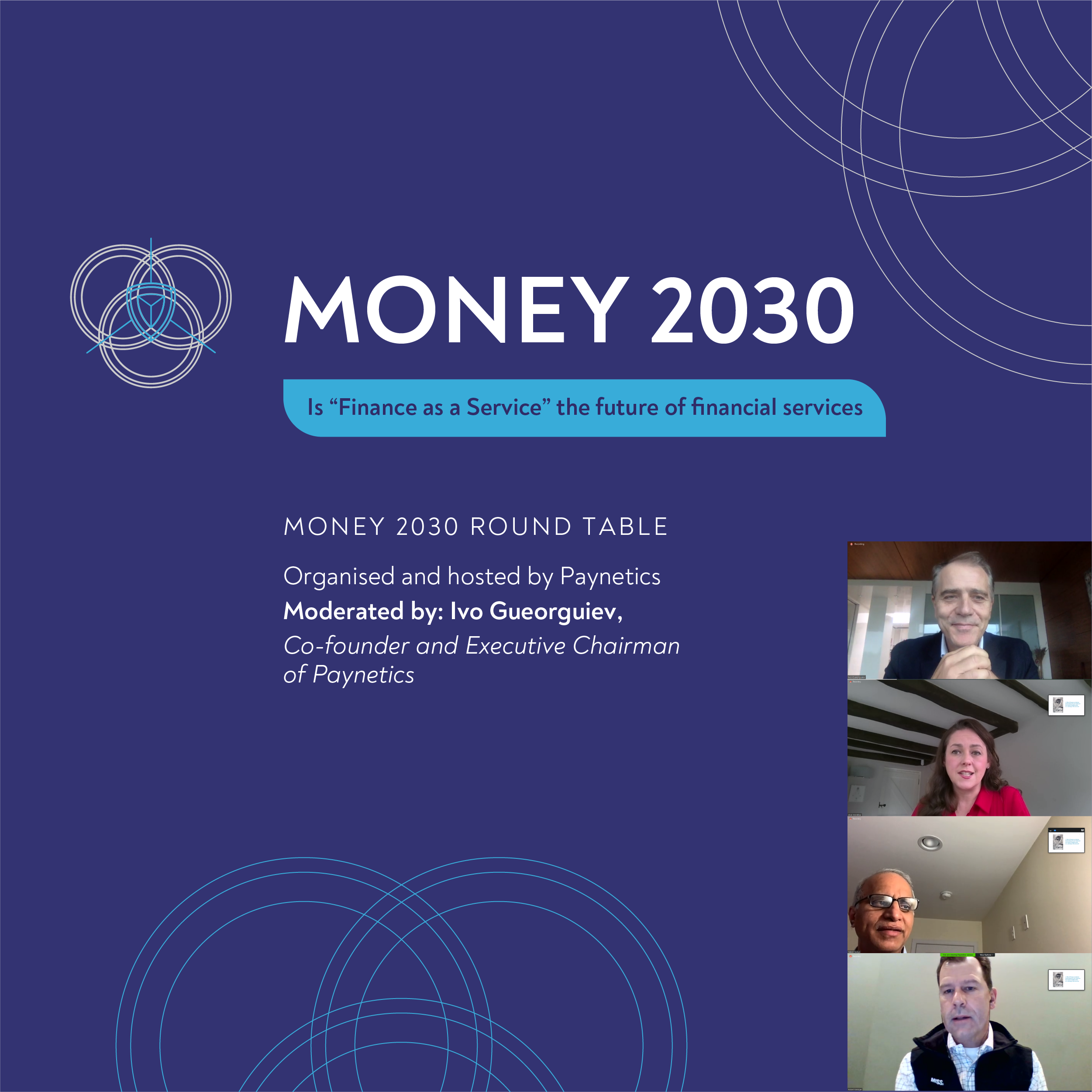Last week, we held the second virtual event of our ‘Money 2030’ series on the future of fintech. We invited expert panellists from across technology, financial services and the businesses that invest in these areas to discuss what they think the industry will look like in ten years’ time.
The theme for our most recent event was “Is ‘Finance as a Service’ the future of financial services?” Chaired by our Executive Chairman and Co-founder Ivo Gueorguiev, our expert panel of speakers included:
- Scott Abrahams, Senior Vice President, Business Development & Fintech, Mastercard
- Robert Matys, IBM Payment Centre, Global Offering Manager, IBM
- Nilesh Vaidya, Executive Vice President, Capgemini
- Zitah McMillan, CEO and Co-Founder of Predictive Black
- Rob Metzger, Senior Advisor, Mission OG
- Dawei Wang, Head of Strategy, Thunes
Over the coming weeks, we’ll be sharing a series of blog posts exploring insights from the speakers and different topics in more detail. For this week, we’re going to look at our panel’s responses to the following questions: “Why is Finance as a Service (FaaS) taking off now?” and “What are the market conditions that are ushering in this new era?”
Mastercard’s Scott Abrahams looked at the different types of FaaS services which are provided, and which can thrive. He noted that there was a new class of fintechs emerging which have a social purpose included in their offering, such as financial inclusion or support for ESG causes. Abrahams stated that these companies may well thrive as they align with consumers’ increased desire for ethical products and services.
Given Robert Matys’ role at IBM he was able to share his insights into the backend operations of Finance as a Service, and stressed the importance of having solid 24/7 operations which can scale to meet demand. He also noted the financial considerations for those investing to build this infrastructure, including: the erosion of payment processing margins, increasing customer expectations and the lowering of regulatory barriers. As a result, the aggregation of backend services grows in importance, and the cost of infrastructure becomes a major determinant in the long-term sustainability of the provisioning of services.
Nilesh Vaidya of Capgemini commented on this trend, saying that the technology is now available to allow this explosion in creativity and drive a further wave of innovative new financial services. In addition, to making technology easier to provision, trends like cloud computing have reduced the overall cost of providing services too, which again is helping to fuel innovation.
All of the panellists agreed that the main factor driving FaaS adoption is consumers – they are growingly expecting the services that they rely on to be delivered in a way that is convenient for them. Robert Metzger of Mission OG addressed how consumers push companies to continually provide services more efficiently, citing faster payments as an example of this trend.
The increasing expectations within consumer financial services mean that all providers across B2C and B2B must now improve the quality of their user experience and the speed at which they are able to provision and provide services. At its root, Robert asserted, this necessitates using technologies like cloud computing and APIs, to enable this speed of development and deployment. This sentiment was echoed by Dawei Wang of Thunes who said that cloud service providers like AWS have made computing more cost-effective and that regulatory changes have led companies to look to build best-in-breed point solutions. This focus on core functionality, starting as a point solution, rather than trying to offer a broader range of functionality at launch, allied to cheaper and easier provisioning of technology means that new services are implemented more quickly.
The theme of regulatory frameworks was picked up by Zitah MacMillan of Predictive Black. Zitah has previously worked at the FCA and her business Predictive Black has become an FCA-approved provider. She stated that the Payment Services Directives (PSD1 and PSD2), open banking and tech enablement have led to a change in the way people view and use financial services. She pointed out that sometimes the more established players may have been reluctant to implement change, but the policy side of things has broadly gone well in establishing the rules of engagement and creating a regulatory framework for businesses to follow.
There was a broad acceptance across the panel of speakers that User Experience (UX) will become an ever-more important differentiator for financial services providers. As technologies like APIs and Open Banking enable consumers to see a range of different data from different providers in one view, ease of set-up and use will become key. New entrants can use Banking or Finance as a Service to provide the backbone of their business while they focus on the customer proposition and UX experience.
Next week, we’ll be looking in more detail at who the winners and losers will be in the race to implement FaaS solutions.
